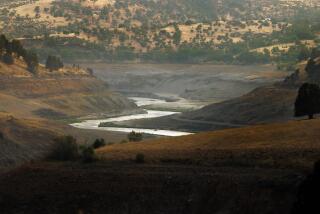Soviets Drop Plan to Divert Northern River Flow
- Share via
MOSCOW — The Soviet Union, apparently reflecting the wishes of its leader, Mikhail S. Gorbachev, has dropped a plan for diverting water from rivers flowing north to irrigate the arid south of Central Asia, a senior official said Tuesday.
“At present, we can manage without the switching of water from the northern rivers,” Leonard Vid, deputy chief of Gosplan, the state planning agency, told reporters.
His statement represented a victory for Soviet writers, concerned about the environment, who have mounted an extraordinary campaign against the rivers project in the state-run media.
But the move is apparently a major setback for political leaders in Central Asian republics, such as Uzbekistan and Kazakhstan, especially if the project is shelved permanently.
The monumental irrigation project, favored by the late Soviet leaders Leonid I. Brezhnev and Konstantin U. Chernenko, was included in proposed guidelines for adoption by the 27th Soviet Communist Party Congress.
Multibillion Dollar Costs
But concern over its multibillion dollar costs and questions about the efficient use of irrigation may have doomed it.
The plan, potentially the biggest public works project in history, had been given the go-ahead by the Central Committee of the Communist Party at a November, 1984, meeting in Moscow. Sponsors said it would provide enough water to assure bountiful cotton and grain crops from southern republics where the land is fertile but dry.
But critics argued that diversion of water from rivers flowing into the Arctic Ocean might change weather patterns not only in the Soviet Union but around the world as well. In addition, the critics said, the project would inundate some ancient towns and affect fishing and river navigation.
Actually, the project was split into two major parts. In the first step, part of the northern flow of several rivers would be routed to the southward-flowing Volga River basin and then to the Caspian Sea. In a projected second stage, a canal would carry waters from the Ob and Irtysh rivers about 1,500 miles to the Aral Sea.
The irrigation scheme has aroused passions as few other issues do in the tightly controlled Soviet society.
More to Read
Sign up for Essential California
The most important California stories and recommendations in your inbox every morning.
You may occasionally receive promotional content from the Los Angeles Times.










